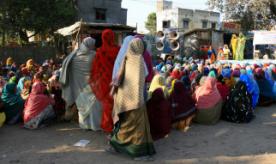Does Female Leadership Impact on the Quality of Public Goods? Evidence from a Public Poverty Alleviation Programme in Andhra Pradesh, India
Poor governance can be an important cause behind the disappointing performance of public programmes in developing countries. In this study we seek to identify the impact of female leadership on the governance of a large poverty alleviation programme in India, in a context where local people can closely monitor the actual against the prescribed allocation of public funds. This project focused on the implementation of projects under the recently renamed Mahatma Gandhi National Rural Employment Guarantee Act (MG-NREGA), perhaps the most comprehensive and radical social policy implemented in India since Independence. The Act, which came into force in February 2006, introduced an annual entitlement of 100 days of work to rural households volunteering adult labor to local public works. A novel and ambitious feature of the Act is the introduction of compulsory “social audits” of MG-NREGA projects by village residents, in effect institutionalizing stakeholder participation as a mechanism to foster transparency and ensure the accountability of those in charge of implementation. The Gram Panchayat (GP) or village council, which comprises a head or sarpanch, elected ward representatives as well as support staff is the executive body at the village level. It is formally responsible for identifying and, jointly with the local bureaucracy, for implementing MG-NREGA projects. The choice of Andhra Pradesh (AP) as the study area is motivated by the state government’s unique decision to back up the social audit process by embedding the responsibility for organizing social audits in an autonomous organizational arm within the Department of Rural Development. The researchers used the nation-wide policy of randomly allocating village council headships to women to identify the impact of female political leadership on the governance of projects implemented under MG-NREGA. Using primary survey data, they find more programme inefficiencies and leakages in village councils reserved for women heads: political and administrative inexperience make such councils more vulnerable to bureaucratic capture. When using a panel of audit reports, governance improves as female leaders accumulate experience. These results suggest that female political leadership may generate gains in governance but only after the initial, gendered disadvantages recede.





